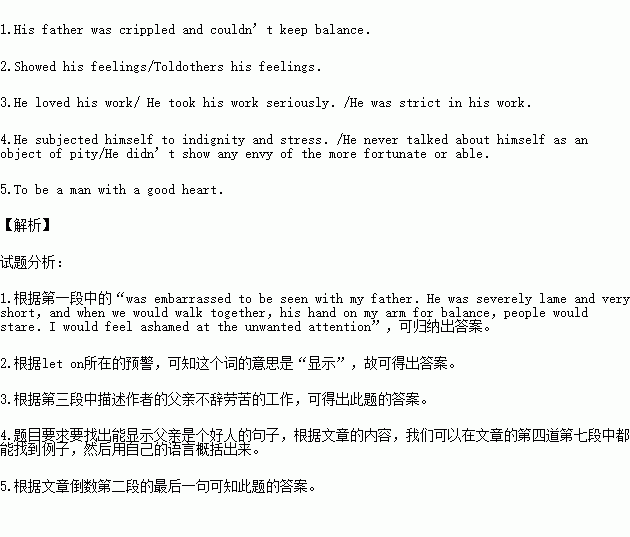题目内容
阅读下面短文,并按照题目要求用英语回答问题。
When I was growing up,I was embarrassed to be seen with my father.He was severely lame and very short,and when we would walk together,his hand on my arm for balance,people would stare.I would feel ashamed at the unwanted attention.If he ever noticed or was bothered,he never let on,nor did he say anything about it.
It was difficult to coordinate(协调) our steps—his pausing,my impatience—and because of that,we didn’t say much as we went along.But as we started out,he always said,“You set the pace,I will try to adjust to you.”
Our usual walk was to or from the subway,which was how he got to work.He went to work sick,and despite bad weather.He almost never missed a day,and would make it to the office even if others could not.A matter of pride.
When snow or ice was on the ground,it was impossible for him to walk,even with help.At such times my sisters or I would pull him through the streets of Brooklyn,NY,on a child’s sleigh to the subway entrance.Once there,he would grasp the handrail until he reached the lower steps that the warmer tunnel air kept ice-free.In Manhattan the subway station was the basement of his office building,and he would not have to go outside until we met him in Brooklyn on his way home.
When I think of it now,I wondered at how much courage it must have taken for a grown man to subject himself to such indignity and stress.And at how he did it—without bitterness or complaint.
He never talked about himself as an object of pity,nor did he show any envy of the more fortunate or able.What he looked for in others was a “good heart”,and if he found one,the owner was good enough for him.
Now that I am older,I believe that is a proper standard by which to judge people,even though I still don’t know precisely what a “good heart” is.But I know the times I don’t have one myself.
My father has been gone many years now,but I think of him often.I wonder if he sensed my unwillingness to be seen with him during our walks.If he did,I am sorry I never told him how sorry I was,how unworthy I was,how I regretted it.I think of him when I complain about incident,when I am envious of another’s good fortune,when I don’t have a “good heart”.
At such times I put my hand on his arm to regain my balance,and say,“You set the pace,I will try to adjust to you.”
1.What wouldn’t the author like others to see?(No more than 10 words)
2.What’s the meaning of the underlined phrase “let on” in the first paragraph? (No more than 5 words)
3.According to the third paragraph,what conclusion can you get about the father’s attitude toward his work? (No more than 8 words)
4.Find an example in the passage that shows the father was a man with a “good heart”.(No more than10 words)
5.What does the author learn from his father? (No more than 15 words)

